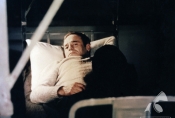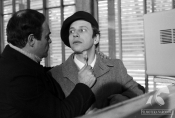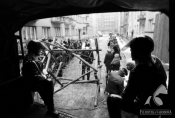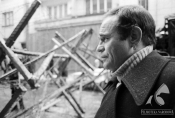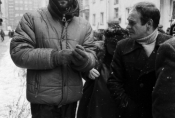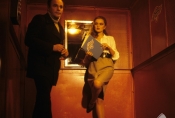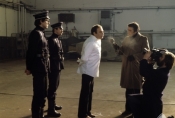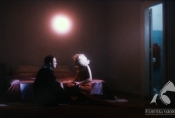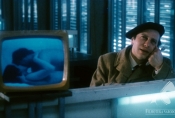WAR OF THE WORLDS - THE NEXT CENTURY [1981]
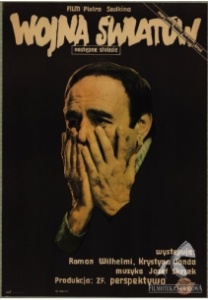
year:
- 1981
release date:
- luty 1983
runtime:
- 92 min
directed by:
- Piotr Szulkin
written by:
- Piotr Szulkin
director of photography:
- Zygmunt Samosiuk
cast:
- Roman Wilhelmi [Iron Idem], Krystyna Janda [prostitute Gea and Idem’s wife], Mariusz Dmochowski [prostitute Gea and Idem’s wife], Jerzy Stuhr [a law intern], Marek Walczewski [a committee registrar], Bożena Dykiel [a nurse], Joanna Żółkowska [a woman with a dog], Wiesław Drzewicz [an old man], Stanisław Gawlik [a porter at Idem’s house], Janusz Gajos [a waterworks worker], Juliusz Kalinowski [an old man taken to donate blood], Stanisław Tym [a censor], Zbigniew Buczkowski [a police officer], Józef Skrzek [a frontman of Instant Glue], Leonard Andrzejewski [pan orderly at the shelter]
edited by:
- Elżbieta Kurkowska
music by:
- Józef Skrzek, Wojciech Gogolewski, Johannes Brahms, Franz Gruber, Christoph Willibald Gluck, Jerzy Maksymiuk
production design:
- Andrzej Haliński
produced by:
- Studio Filmowe „Perspektywa”
executive producer:
- Jerzy Rutowicz
awards:
-
• SF Film Festival Porto (Portugal) 1982: Grand Prize
• SF Film Festival Avoriaz (France) 1982: Special Award
• SF Film Festival Madrid (Spain) 1982: Grand Prix Monolith, awards for best screenplay, best director, best cinematography, best performance for Roman Wilhelmi
• SF Film Festival Trieste (Italy) 1982: Special Jury Award, best performance award Asteroid Silver for Roman Wilhelmi
• European Congress of SF Societies Eurocon SeaCon Brighton (United Kingdom) 1984: award for best SF director
About the film
An impressive science fiction spectacle dedicated to Herbert G. Wells, author of the story, War of the Worlds, and Orson Welles, the author of the famous radio show hoax about a Martian invasion, which in 1938 caused panic among the American audience. A study of a passive society controlled by the all-powerful medium of television, and an ironic look at the profession of a television showman.
It is the year 2000, two weeks after the Martian invasion of Earth. Iron Idem, a TV station reporter, is forced to read a message ordering people to establish friendly relations with the Martians and to donate blood for them. He is coerced to do that through violence. He yields to the propaganda pressure and uses the benefits of his "friend of Martians" card, spending time with a prostitute called Gea. In moments of reflection, he realises his complete dependence on television. Several days later, the station is preparing to broadcast a farewell to the Martians. During the performance, Idem invades the grandstand and gives a rebellious speech, ending in his arrest. Watching TV news in his cell, he finds that the propaganda line has changed completely: Martians are now considered aggressors and perpetrators of many crimes. Idem is considered a collaborator... his execution is broadcast on television, but it is also just a staged performance.
Jan Słodowski, Leksykon polskich filmów fabularnych, Warszawa 1996
